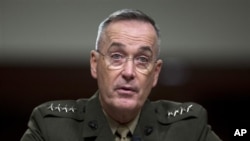CAPITOL HILL —
A U.S. general nominated to oversee the drawdown of American troops in Afghanistan by 2014 says a central goal of the 11-year war has yet to be achieved. Marine General Joseph Dunford says terrorists and their Taliban allies continue to operate in Afghanistan.
At his confirmation hearing before the Senate Armed Services Committee, General Dunford acknowledged that America’s longest war has not met its primary original objective: rooting out al-Qaida and the militants who give sanctuary to terrorists. But he cited statistics showing progress made as a result of multinational efforts in Afghanistan.
“Seventy-six percent of the population is currently secured by Afghan security forces. The vast preponderance of violence is now taking place outside of populated areas. The Taliban have been displaced from the population, and I view that as a sign of success,” Dunford said.
Dunford added that Afghanistan has recruited more than 300,000 security force members, and that he expects them to be fully-trained during the next year. He said he is “encouraged” by what he has seen of the evolving capabilities of Afghan troops.
Committee Chairman Carl Levin was one of several senators expressing grave concern about so-called “insider” attacks on coalition troops by Taliban militants who have infiltrated Afghan security forces.
The committee’s top Republican, Senator John McCain, said the Obama administration’s planned drawdown of forces in Afghanistan constitutes a “rush to failure”.
“The president’s repeated emphasis on withdrawal, without laying out what would constitute a successful and sustainable transition, has only fed the belief in Afghanistan that the United States is committed to getting out regardless of conditions on the ground. This doubt has encouraged all actors in Afghanistan and in the region to hedge their bets, which increases the worst instincts of the Afghan government, and increases the chance of a return to civil conflict in our absence,” McCain said.
General Dunford did not comment on administration policies. President Barack Obama has said that ending the war in Afghanistan will allow the United States to tend to pressing needs at home.
Senator McCain had a bottom-line question for the general. “Do you think we are winning the war in Afghanistan?”
Dunford replied: “I think we are making progress, and I believe our objectives are achievable.”
Dunford expressed hope the United States and Afghanistan can forge a security agreement for the post-2014 period, saying an accord would send an important message to militants in Afghanistan as well as to governments throughout the region.
If confirmed, Dunford would be the sixth U.S. commander in Afghanistan, responsible for all NATO forces. Fewer than 70,000 U.S. troops remain in Afghanistan, following the withdrawal of “surge” forces President Obama ordered to Afghanistan in 2009.
An assistant commandant of the U.S. Marine Corps, Dunford led a regiment in the 2003 invasion of Iraq.
At his confirmation hearing before the Senate Armed Services Committee, General Dunford acknowledged that America’s longest war has not met its primary original objective: rooting out al-Qaida and the militants who give sanctuary to terrorists. But he cited statistics showing progress made as a result of multinational efforts in Afghanistan.
“Seventy-six percent of the population is currently secured by Afghan security forces. The vast preponderance of violence is now taking place outside of populated areas. The Taliban have been displaced from the population, and I view that as a sign of success,” Dunford said.
Dunford added that Afghanistan has recruited more than 300,000 security force members, and that he expects them to be fully-trained during the next year. He said he is “encouraged” by what he has seen of the evolving capabilities of Afghan troops.
Committee Chairman Carl Levin was one of several senators expressing grave concern about so-called “insider” attacks on coalition troops by Taliban militants who have infiltrated Afghan security forces.
The committee’s top Republican, Senator John McCain, said the Obama administration’s planned drawdown of forces in Afghanistan constitutes a “rush to failure”.
“The president’s repeated emphasis on withdrawal, without laying out what would constitute a successful and sustainable transition, has only fed the belief in Afghanistan that the United States is committed to getting out regardless of conditions on the ground. This doubt has encouraged all actors in Afghanistan and in the region to hedge their bets, which increases the worst instincts of the Afghan government, and increases the chance of a return to civil conflict in our absence,” McCain said.
General Dunford did not comment on administration policies. President Barack Obama has said that ending the war in Afghanistan will allow the United States to tend to pressing needs at home.
Senator McCain had a bottom-line question for the general. “Do you think we are winning the war in Afghanistan?”
Dunford replied: “I think we are making progress, and I believe our objectives are achievable.”
Dunford expressed hope the United States and Afghanistan can forge a security agreement for the post-2014 period, saying an accord would send an important message to militants in Afghanistan as well as to governments throughout the region.
If confirmed, Dunford would be the sixth U.S. commander in Afghanistan, responsible for all NATO forces. Fewer than 70,000 U.S. troops remain in Afghanistan, following the withdrawal of “surge” forces President Obama ordered to Afghanistan in 2009.
An assistant commandant of the U.S. Marine Corps, Dunford led a regiment in the 2003 invasion of Iraq.









